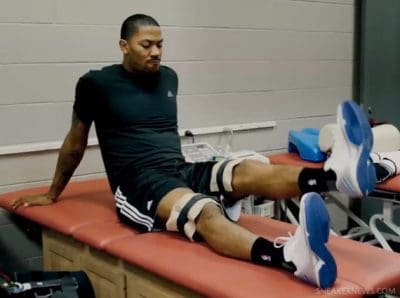Injury is a common occurrence in sport participation. Ask any athlete and they'll tell you that one of the drawbacks they can experience in their specific physical activity is injury.
Being hurt can mean a number of things to an athlete out of the pain they experience. Firstly, injury can bring a stop to training (i.e., coaching) and may indicate that what they've devoted lots of their time and energy and can too be removed quite suddenly (Crossman, 1997). Sport participation is a part of the identity of an athlete and so sports are a tremendous portion of their lives. When that is removed, albeit for a short time period, this can have a possible psychological effect on how an athlete views themselves.
Additionally, injury can take away the positive reinforcements sport provides where athletes undergo a feeling of mastery, autonomy and sense of control (Deutsch, 1985). Injury might be thought of as a setback because sport is used by athletes as a means of managing anxiety, stress and depression, among other things.
Psychological Effects on Injured Athletes
Understandably then, it may be anticipated that athletes can undergo a number of psychological reactions and stress upon becoming injured. Athletes' psychological experiences differ as no one person experiences injury precisely in the same manner. Yet some emotions are more commonly reported than others and include stress, fear, anger, tension, fatigue, doubt, lack of motivation, and aggravation (Ahern & Lohr, 1997; American College of Sports Medicine, 2001; Klenk, 2006).
Of course it is normal for athletes to experience these emotions in reaction to trauma or injury and it is therefore necessary to be aware that not all athletes encounter an observable psychological disturbance to being hurt. They are athletes who seem to take being injured in their stride and their emotional reactions appear to resolve. On the flip side, other athletes appear to fight emotionally and their responses become problematic when symptoms do not resolve.


Though there's no predictable sequence of an athlete's psychological responses to injury, athletes often exhibit three classes of reaction to their injury. To help come to terms with their injury, athletes often attempt to get and interpret as much injury-relevant information they can (i.e., "How bad is it?" , "How long?" , "What can/can't I do", "Just how can I fix it?") . As previously discussed, athletes may experience reactive behavior and psychological upheaval . Often athletes may ask questions or have thoughts that are like the following: "I can't believe this has happened today", "I'll never return to 100%", and "I'm no good to the group today". Athletes with apparent psychological effects can frequently display a range of signs suggesting poor adjustment to the injuries, including:
- Feelings of anger & confusion
- Obsession with “when can I return to play?”
- Trying to do too much too soon in terms of rehabilitation program (pushing the limits)
- Denial (e.g., “The injury is no big deal”)
- Repeatedly returning to play too soon & experiencing re-injury
- Exaggerated bragging about accomplishments
- Dwelling on minor physical complaints
- Sleep disturbances
- Alterations in diet
- Guilt about letting the team down
- Withdrawal from significant others
- Rapid mood swings
- Statements like “no matter what is done, it will never get better”
The final category indicates that athletes come to terms with the injury and engage in successful coping. If there is anything they could do at home or may help out in training athletes voice that the injury is starting to appear good or often think so, and ask their service network if their responses resolves than becomes debatable. But if an athlete is exhibiting problematic signs of adverse effect as a consequence of their injury, it is very important for them to find help from a sport psychologist who can assist them manage and cope more effectively with their injury thus assisting their injury recovery procedure.

Research has shown that negative emotions experienced by injured athletes may affect athletes' attitudes toward and subsequent recovery from trauma (Ahern & Lohr, 1997; Crossman, 1997). Using psychological strategies have been found to improve injury recovery, mood through healing, coping, confidence restoration, pain control, and adherence to treatment protocols (Brewer et al., 2000).
Improving Athlete's Psychological Skills
Psychological skills like goal setting, imagery and relaxation helps athletes cope better with stress, reducing likelihood of harm and stress of harm should it occur. In addition, even athletes that deal with injury can benefit from studying these strategies as they are sometimes utilized to boost performance on a basis that is constant.
Other psychological skills utilized to cope effectively with trauma but can also be used to enhance operation after experiencing injury include self-talk to help athletes have a positive attitude to rehabilitation and build confidence as well as problem solving to help deal with setbacks and search for opportunities. In addition to abilities, it is essential for athletes to be more educated in the recovery procedure and their injury to help reduce uncertainty and provide them with clear expectations and also to keep them informed.
 The scope of our information is limited to chiropractic and spinal injuries and conditions. To discuss options on the subject matter, please feel free to ask Dr. Jimenez or contact us at 915-850-0900 .
The scope of our information is limited to chiropractic and spinal injuries and conditions. To discuss options on the subject matter, please feel free to ask Dr. Jimenez or contact us at 915-850-0900 .By Dr. Alex Jimenez
Additional Topics: Sports Care
Athletes engage in a series of stretches and exercises on a daily basis in order to prevent damage or injury from their specific sports or physical activities as well as to promote and maintain strength, mobility and flexibility. However, when injuries or conditions occur as a result of an accident or due to repetitive degeneration, getting the proper care and treatment can change an athlete's ability to return to play as soon as possible and restore their original health.





